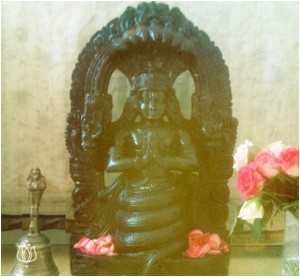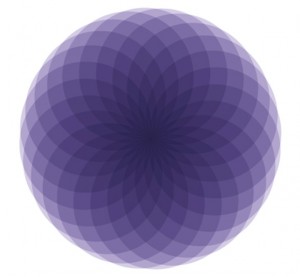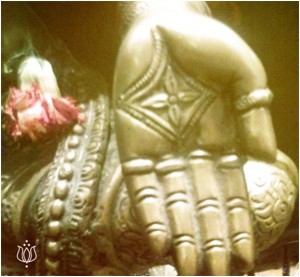The Gift of Consciousness: Patañjali’s Yoga Sūtras
An International 4-Module Course on the Yoga Sūtras in Study and Practice
With Gitte Bechsgaard (PhD) and distinguished Iyengar Yoga Teachers
 We are committed to providing students and teachers of Yoga with an inspiring course of study and practice that is grounded in the tradition of Patañjali’s Yoga. Patañjali’s aphorisms, known as the Yoga Sūtras, offer profound insight on a wide range of contemporary questions and concerns such as the search for meaning, the role of spiritual practice in daily life, and the potential of human consciousness. Over a period of 4 retreats or “modules”, we will explore this rich storehouse of wisdom, focusing particularly on Yoga philosophy and Yogic psychology. Each of the 4 parts will occur over a period of 5 days and will include daily lectures on sūtra material as well as the traditional recitation of sūtras in Sanskrit.
We are committed to providing students and teachers of Yoga with an inspiring course of study and practice that is grounded in the tradition of Patañjali’s Yoga. Patañjali’s aphorisms, known as the Yoga Sūtras, offer profound insight on a wide range of contemporary questions and concerns such as the search for meaning, the role of spiritual practice in daily life, and the potential of human consciousness. Over a period of 4 retreats or “modules”, we will explore this rich storehouse of wisdom, focusing particularly on Yoga philosophy and Yogic psychology. Each of the 4 parts will occur over a period of 5 days and will include daily lectures on sūtra material as well as the traditional recitation of sūtras in Sanskrit.
The 2 year, 4-module Yoga Sūtras course is standardized in order to ensure a high level of philosophy teaching in various international locations. The philosophy component of the course is mandatory for all students. In terms of practice, we welcome all students and teachers of Yoga irrespective of practice level/style and lineage. Because of this, you may choose from 2 forms of practice during the modules: i) āsana (Yoga postures) and prānāyāma classes taught by distinguished teachers from the Iyengar Yoga lineage; ii) self-practice (available only in certain locations- see Daily Schedules for more details). All of the guided āsana and prāṇāyāma classes will incorporate philosophy teachings from the course, highlighting the many ways in which the wisdom of the Yoga Sūtras can shape and transform our practice.
Whether you are looking for an intensive course of study and practice, a quiet retreat, or a time for healing & replenishment, the core course material combined with the rich mandala of Yogic practices- āsana, prāṇāyāma, and contemplative practice (citta parikarma sādhanā)- are designed to support your current practice and development.
Modules
This 4 module course covers, in depth, “practice relevant” material from the Yoga Sūtras. The teachings will emphasize a firm foundation in the philosophical and psycho-spiritual aspects of Yoga as laid out in Samādhi Pāda (Book One of the Yoga Sūtras) and also in The Gift of Consciousness.
Module 1 focuses on the fundamentals of Yoga including Yogic psychology, while Module 2 will mostly center on the transformative power of Yogic practice. In module 3, we will explore the rich variety of contemplative practice laid out in the Yoga Sūtras. In addition, the teachings will focus on the obstacles to Yogic progress as described in traditional Vedic scriptures. Finally, module 4 will concentrate on Yoga as mystical trance and the subtler limbs of dhāraṇā (concentration), dhyāna (meditation), and samādhi (meditative absorption).
To learn about each of the four modules in greater detail please view below
Module 1: Fundamentals of Yoga and Yogic Psychology
“Yoga is a mirror to look at ourselves from within.” (B.K.S. Iyengar)
 In this first Yoga intensive, we will examine the model of the mind that Patañjali provides in the first chapter of the Yoga Sūtras. Along the way, we will explore the concept of Yoga as both the essential means and ultimate destination of the inner journey. The Vedic theory of the three essential modes of nature (tamas, rajas, and sattva), as well as the fundamental tenets of Yogic psychology will be discussed.
In this first Yoga intensive, we will examine the model of the mind that Patañjali provides in the first chapter of the Yoga Sūtras. Along the way, we will explore the concept of Yoga as both the essential means and ultimate destination of the inner journey. The Vedic theory of the three essential modes of nature (tamas, rajas, and sattva), as well as the fundamental tenets of Yogic psychology will be discussed.
Module 2: Cultivation and Yogic Practice
“The word sādhanā is often translated as ‘quest’. The term ‘quest’ conveys the idea of a long and arduous search and investigation through practice.” (B.K.S. Iyengar)
 Yogic practice is traditionally viewed as a life-long endeavor. It is an inner pilgrimage of the soul. Through practice we can come to realize our inner potential, for without cultivation, self-betterment remains an abstraction. Practice is a catalyst that brings embodied transformation to life, turning ancient knowledge into lived wisdom. Foundational practice as a transformative power is at the very heart of the teachings in this second Yoga intensive.
Yogic practice is traditionally viewed as a life-long endeavor. It is an inner pilgrimage of the soul. Through practice we can come to realize our inner potential, for without cultivation, self-betterment remains an abstraction. Practice is a catalyst that brings embodied transformation to life, turning ancient knowledge into lived wisdom. Foundational practice as a transformative power is at the very heart of the teachings in this second Yoga intensive.
Module 3: Intensification and Contemplative Practice
“Problems in life will always exist, but through the recognition of your own heart a higher awareness comes about, and you are able to see a greater purpose in everything that happens.” (Swami Chidvilasananda)
 In this 3rd module, we will explore the main contemplative practices described in Patañjali’s Yoga Sūtras. As a group these meditative techniques are referred to as the citta parikarma practices. This term encompasses a wide range of inward-minded practices all of which hold the power to calm the mind and clarify consciousness. Some of these practices concern the Yoga of right relationship- they relate to the cultivation of concentration in ways that can help us to heal and grow through healthy relationships, either with other people, with a Guru or mentor, with a chosen deity, or perhaps even with our own heart, breath, and higher mind.
In this 3rd module, we will explore the main contemplative practices described in Patañjali’s Yoga Sūtras. As a group these meditative techniques are referred to as the citta parikarma practices. This term encompasses a wide range of inward-minded practices all of which hold the power to calm the mind and clarify consciousness. Some of these practices concern the Yoga of right relationship- they relate to the cultivation of concentration in ways that can help us to heal and grow through healthy relationships, either with other people, with a Guru or mentor, with a chosen deity, or perhaps even with our own heart, breath, and higher mind.
Together, these practices offer a most essential and life-giving medicine, a solution to be applied in the face of roadblocks or inner agitation. During this intensive, we will also discuss these perennial “roadblocks” or obstacles, examining how they affect our mind, path, and heart.
Module 4: Destination and Meditation
“We need for life to signify, to touch the eternal, to understand the mysterious, to find out who we are.” (Joseph Campbell)
 According to Patañjali, Yoga embraces a wide range of meditative states. All of these fall under the umbrella term of samyama. These states of super-consciousness are primarily characterized by the gradual stilling of the mind through the meditative trinity of dhāraṇā (concentration), dhyāna (meditation), and samādhi (meditative absorption).
According to Patañjali, Yoga embraces a wide range of meditative states. All of these fall under the umbrella term of samyama. These states of super-consciousness are primarily characterized by the gradual stilling of the mind through the meditative trinity of dhāraṇā (concentration), dhyāna (meditation), and samādhi (meditative absorption).
When meditative practice intensifies, the seeker experiences a break-through of the intuitive, the sacred, and the mystical into their otherwise everyday, conditioned consciousness. In all world religions, we find that the mystical path is characterized by this kind of direct experience of the transcendental or sacred.

![]()
